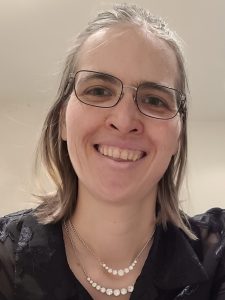In this instalment of Earmark, we catch up with Associate Composer Julia Jacklein about taking time to focus on the essentials, ways in which research and study intersect with music and when to know to call it quits on a composition.

CMC: What are your plans as we ease out of the pandemic? How has your form of artistic practice changed (if it has at all)?
Julia Jacklein: I would like to spend more time in nature and allow my music to grow out of experiences with nature. I feel that there is a very great source of inspiration there, and a source of potential learning that I wish to tap into further. I feel like my music has grown simpler through the pandemic, and I found myself focusing more on what is truly essential – both musically, and in my life.
CMC: What got you excited about music at a young age?
JJ: When I was little, I used to love sitting under the piano listening to my father play. I also remember responding in all kinds of ways to children’s recordings. It was wonderful to start taking piano lessons at age 7.
CMC: What is an important music concert/event you attended?
JJ: It’s impossible to name only one concert! Among the most important are: a concert of erhu music given in Hamilton many years ago, a performance of contemporary organ music that I heard in Germany, and various excellent concerts given by Tafelmusic… All of these opened up new ways of listening, and of understanding my work as a composer.
CMC: What have you been listening to lately?
JJ: Since I’ve spent the last eight weeks preparing to move, moving, and settling into a new city, it has been hard to find the space and quiet for listening to music. Instead, I’ve used my free moments to study languages, which is something I started during the pandemic. This is, of course something that involves careful listening, and I feel it has helped me very much as a composer, especially with regards to observing minute inflections of sound and expression. I have found myself enjoying the similarities between language and music, and am already collecting ideas for a composition in which I will explore some of my observations further.
CMC: What is a significant insight that a mentor shared with you that has guided your practice?
JJ: A mentor once told me to “make sure I am done with a piece before it is done with me.” I feel that this was excellent advice and have often been reminded of these words when I found myself spending too long on a composition – perhaps unable to resolve issues within the composition, or unable to develop my initial idea to work with new insights gained since starting the piece. Sometimes, I’ve outgrown compositions, and although in those cases it was tempting to return to them later, sometimes it worked out much better to let them go. I feel that this mentor’s advice has helped me to better assess which music to spend time on, and which music to put aside.
CMC: Tell me about a project/work of yours that you are particularly proud of.
JJ: My choral composition “Stars,” is one that represents an important step forward in my growth as a composer. It is a setting of Sara Teasdale’s poem, “Stars,” which I wrote in 2019 for Choral Chameleon. I first became familiar with Teasdale’s poem after hearing Ēriks Ešenvalds’ setting of it in 2017. Eventually I decided that I wanted to set this text to music myself. It was an exciting process, during which I also researched writings and visual art on the subject of stars from around the world. I feel that this in-depth exploration of my subject helped to make the composition one of the best I’ve written.

